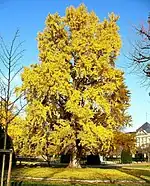ginkgo
English

Gingko tree
Etymology
From Japanese 銀杏 (ginkyō), from Chinese 銀杏/银杏 (yínxìng, “silver apricot”). Ginkgo is the name that is printed in Amoenitatum exoticarum politico-physico-medicarum Fasciculi V [...] (1712) authored by Engelbert Kaempfer, the first Westerner to see the species. In his way of transcription ginkyo would have been Ginkjo or Ginkio but was printed as Ginkgo.[1] This was read by Carl Linnaeus, and the misspelling stuck.
Pronunciation
- (UK) IPA(key): /ˈɡɪŋ.kəʊ/
Audio (Southern England) (file) Audio (US) (file) - Rhymes: -ɪŋkəʊ
Noun
ginkgo (plural ginkgos or ginkgoes)
- Ginkgo biloba, a tree native to China with small, fan-shaped leaves and edible seeds.
- The seed of a ginkgo tree.
- 2001, J. G. Thirlwell (lyrics and music), “Heuldoch 7B”, in Flow, performed by Foetus:
- I swear the gingko's working in reverse
Alternative forms
Synonyms
Derived terms
Translations
tree
|
References
- Wolfgang Michel, On Engelbert Kaempfer’s “Ginkgo”, 2011
Anagrams
French
Pronunciation
- IPA(key): /ɡiŋ.ko/
Audio (file)
Further reading
- “ginkgo”, in Trésor de la langue française informatisé [Digitized Treasury of the French Language], 2012.
Portuguese
Romanian
Spanish
Further reading
- “ginkgo”, in Diccionario de la lengua española, Vigésima tercera edición, Real Academia Española, 2014
This article is issued from Wiktionary. The text is licensed under Creative Commons - Attribution - Sharealike. Additional terms may apply for the media files.